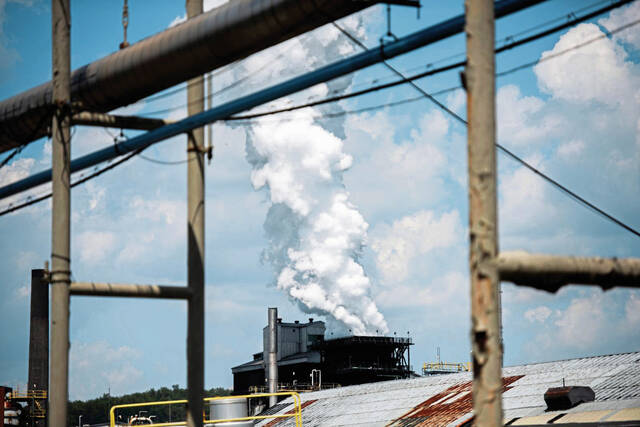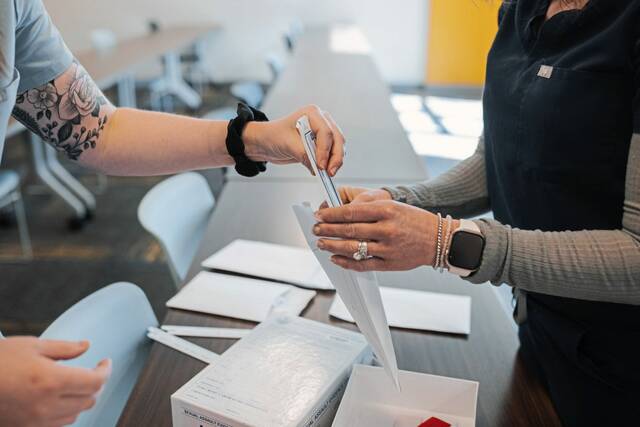Community-supported agriculture has been around for years, said Don Kretschmann, owner of Kretschmann Family Farm in Beaver County. But now, during a public health crisis, the assets of local, organically-grown produce is really catching on.
Moreover, the long-standing distribution method is built for the time of social distancing: Most customers get the weekly or biweekly deliveries at a open-air pickup location, or directly at the farms.
“It’s like they suddenly got religion,” Kretschmann said.
Most businesses are struggling under the state-mandated closures, but the region’s community-supported agriculture is thriving. Several farms in Western Pennsylvania have reported increases in subscriptions amid the covid-19 pandemic.
“It’s like every day, there’s 15 to 20 people,” Kretschmann said. “It’s gotten to the point where my wife keeps saying, ‘You’ve got to cut it off.’ It’s just amazing the demand that is out there all of the sudden.”
Community-supported agriculture is a system in which consumers subscribe to local farms in return for a share of the harvest. The farms, colloquially known as CSAs, put emphasis on community food sources and collaboration. They often not only grow food themselves, but will invite customers to take part in the planting and harvest.
Under normal conditions, many local CSA farmers say they operate under tight budgets, especially in the spring, before the harvest comes in. That’s changed in recent weeks, though. Farmers believe the pandemic has brought with it a heightened awareness for food quality and origins.
“In the last month, with all the restrictions and the concerns about our food chain, people are a little bit concerned with where their food is coming from,” said Paul Sarver, at Sarver Hill Farms in Greensburg.
With a CSA, it is often the same set of hands growing, washing, packaging and delivering produce, which reduces a buyer’s exposure to other people, in addition to their exposure to fertilizers and preservatives that have always caused health concerns.
At Sarver Hill Farms, subscriptions are mostly sold in December or early January, to prepare for the first produce distribution May 21. Sales in April usually make up only one or 2% of sales, said Sarver – this year, April made up about 30%.
“It’s coming practically too late,” Sarver said. “It’s always beneficial. There are always other projects on the farm, so we’re able to catch up with that. But really, I’m buying all my organic seeds, my minerals in December and January. Everything was already paid for.”
Several CSA farmers in the region echoed that while subscriptions have skyrocketed in recent weeks, that won’t necessarily equate to a greater harvest – most of the work has already been done on that front. But the additional income will help support the farms in the long term.
For consumers, local CSAs feel like a quaint area that remains untouched by the pandemic, which has altered nearly every aspect of life, including food production. In recent days, covid-19 has been cited for causing disruptions in food supply chains. The outbreak has caused meat production facilities to shut down, grocery stores to restrict hours and purchases of some products and farmer’s markets to operate under restricted guidelines.
But on these organic farms, life is mostly unchanged, said Greg Boulos, owner of Blackberry Meadows Farm in Fawn. Field work has always been conducive to social distancing.
Subscribers are still able to bring their families and walk around the grounds as they have in the past – a respite from shelter-in-place guidelines. In some ways, the pandemic has strengthened the farm’s relationship with local consumers, beyond just increasing business. Blackberry Meadows has sold out all of its CSA subscriptions.
“This year more than others, we feel more reason to keep our community together,” said Boulos. “We’ve often thought of our farm as being a community center, more so than it is just a food production machine.”
In recent years, Boulos said he has watched four or five local farms go out of business, unable to make a profit. But covid-19 may have presented a chance for organic farms and CSAs to connect with new customers who were previously apathetic about their food sources.
“I am hopeful that we’ll see a cultural shift back to local,” Boulos said.
For the farmers in the region, the pandemic has renewed a drive to foster community.
“The idea of the CSA is not just a subscription,” Sarver said. “It’s a network between the community and the grower.”








